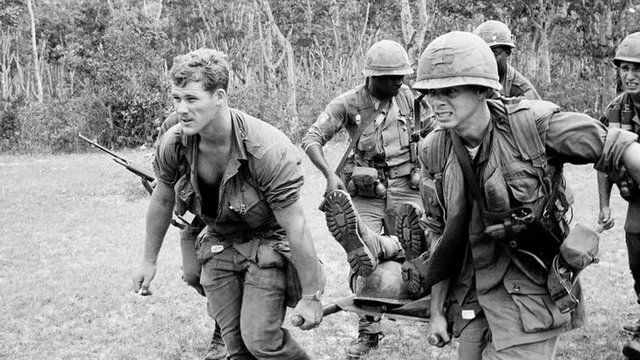The Things They Carried

The Things They Carried tells us about the unease and lack of confidence in their mission the US soldiers had during the Vietnam War. Some soldiers even turned into monsters. What I found interesting was I was originally under the impression that Mary Anne Bell joined the Viet Cong, apparently it was the Green Berets when I googled more. I suppose this amorphousness or unclarity about which side she was on is a reflection of Tim O’Brien’s view of the war: the goals of the war were unclear, neither side was truly or good or bad and while the war motivation behind the war was good, the way it was carried out was so vicious (see: Napalm Girl) that it became a crime.
Another thing that struck me was how in the chapter The Man I Ambushed is how starkly clear Tim O’Brien is about the lack of ethics this war was based on, it’s complete hollowness and strategic bankruptcy...yet he never tries to “frag” his officers or anything like that. Is this an example of talking to talk but not walking the walk? Does this mean the far-left radicals who took up arms against the US government in the late 1960’s were more “honest” then the peaceful protesters and draft-card burners...or were the far-leftists actually Soviet stooges who were harmful to the anti-Vietnam War movement and helped destroy it?
Another thing that struck me was the soldier who wore a stocking on his neck. This seemed to me to be the ultimate hypocrisy. A soft, delicate piece of clothing being paired with a brutish bloodbath. Massacring the peasants of Vietnam on behalf of his dear “love?” Twisted in a way. This reminds me of the iconic photograph of the American soldier with the helmet that has an ironic peace-slogan. It also reminds me of the liberal quote that we should have dropped “nylons from B-52’s, not nuclear weapons” on communist countries in order to convert them to capitalism.
In “The Raining River” he describes contemplating fleeing the draft in Canada, which really struck me as fascinating how Canada became a progressive haven (the Trudeau family also becoming friendly with Fidel Castro of Cuba) when in the World War 2 years (and even immediately after) it was viciously antisemitic under the leadership of William Lyon Mackenzie King, refusing to let Jews in as refugees (and turning away ships) in the 1930s while allowing Nazi war criminals to disembark there. This connects of course again to Cuba, which also refused to allow Jews in before the Holocaust under the repressive, right-wing Fulgencio Batista regime, which are two of multiple examples of “New World” ex-colonies which had murderous pasts. The Vietnam War itself brought back the memories of fascism to the forefront of the country. Examples such as Senator Abraham Ribicoff calling the behavior of Mayor Daley's policemen operating against the Vietnam War protestors as akin to “Gestapo tactics.” The heroic United States which destroyed fascism during the World War became a real threat to humanity during the 1960s, while the countries which were fascistic or neutral to fascism like various European countries during World War 2 (or New World countries like Batista’s Cuba) became advocates of peace and humanism, an example being Olaf Palme’s Sweden.